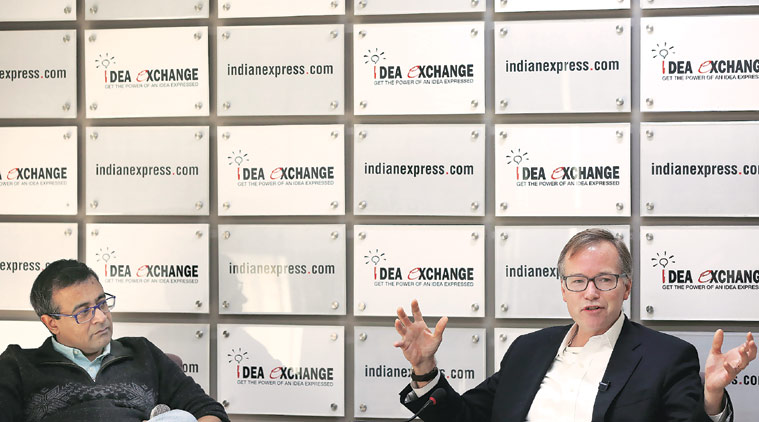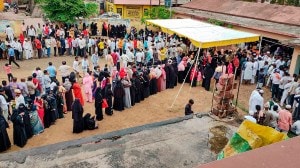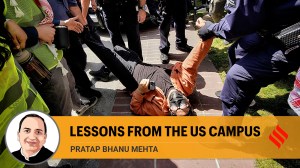- India
- International
People have said (Pak) army is on board for 20 yrs. But you’ve to see change in behaviour: Steve Coll
Author and journalist Steve Coll explains how al-Qaeda has lost space to the Islamic State, warns against the use of the IS brand by opportunists in India to provoke conflict.
 Author and journalist Steve Coll (right) with National Editor, Strategic and International Affairs, Praveen Swami at The Indian Express office. (Source: Express photo by Ravi Kanojia)
Author and journalist Steve Coll (right) with National Editor, Strategic and International Affairs, Praveen Swami at The Indian Express office. (Source: Express photo by Ravi Kanojia)
Praveen Swami: The US is less dependent on the Middle East now than it had been in the past. It has become independent, it may become a net exporter of hydrocarbons in the not too distant future. Americans are also getting increasingly tired of the endless wars around the planet. Will the US continue to be the sole guarantor of order in the Middle East in the future?
If they are the guarantor of order in the Middle East currently, then someone should ask for refund on their premiums. But I think the historical Cold War and post-Cold War equation of US engagement and dependency in the Middle East has fundamental, structural aspects. One is the alliance with Israel. Second is the oil equation with Saudi Arabia, which is no longer relevant for either side. Third was the development, right from the beginning of post- Second World War era of the Gulf, of an elite relationship with Saudi Arabia, later the UAE, Bahrain and now Qatar, use of that platform as essentially a US forward aircraft carrier. If you look at the infrastructure of the American power projection in the Gulf States — the access to carrier refuelling and supply that the UAE provides, airbase in Qatar, intelligence relationships with all of those, the naval facilities in Bahrain — this is an investment that would be difficult for any American president to walk away from. They worry continuously about the stability of these regimes.
There are different problems, the indigenous populations of the UAE, Qatar and Bahrain, the history of Shiaism among its population, the rest of the UAE and Qatar, they are all absolutely critical to defence infrastructure of the US. Their indigenous populations are so small and the wealth is so great that they look quite stable.
Watch Steve Coll On US & The Middle East, Al-Qaeda & ISIS And India-Pak Relations
Praveen Swami: President Obama had cautioned that there are signs, possibly, of the coming of World World III. There is concern across the Middle East that many regimes to come, including the Gulf monarchies, might be vulnerable to destablisation in the future. How real is that threat?

The Saudi Arabia monarchy is clearly vulnerable to domestic unrest. It has a large young under-educated population that has been exposed to a form of politicised ideology that has revolutionary characteristics. I don’t see the Islamic State as a vehicle for sustainable revolt by the Saudi young men against the government, because the Saudi State has a record of being able to repress that kind of a movement. But what you could imagine would be a more broadly displaced dissatisfaction, of the Arab Spring character, with the Saudi regime, that leads to chaos, violence of some sort, and have factions emerge — like it happened in Syria — claiming the revolution in the name of various Islamic ideologies and brands. That would also be an opportunity that not only the Islamic State would exploit but also the faction leaders in the civil conflict and environment would seek to exploit. That’s what has happened in Iraq too.
Islamic State is just a flag that disenfranchised battles, among others, decided to wave because it was effective after years of being marginalised and failing to negotiate power with the government.
Praveen Swami: Does the Russian intervention in Syria mark a fundamental shift in the way great power is being exercised in the region?
I don’t think it is a fundamental shift, (Russian President Vladimir) Putin would be too opportunistic an intervener for it to be that. I think the intervention that he authorised (on September 30, 2015)… it has already been exposed as perhaps more costly and riskier than he anticipated. It has not been as successful as his intervention in eastern Ukraine. I think he plays his hand forward, looks at the board, and thinks, ok, now what.
Praveen Swami: The debate over interventions has raged on for years, but we now have a record of Middle Eastern interventions that have gone wrong, starting with Iraq, Libya, Syria… Has this led to any rethinking in Washington?
Certainly. It is a rethinking that American people forced upon Washington, as much as one that Washington initiated, having suffered consequences in lives and limbs in Iraq war and Afghan war. I think within the national security establishment, from the beginning, since September 11 (9/11), there were competing arguments. It wasn’t as if the Bush (former US President George W Bush) Cabinet sat and said I am going to choose this military doctrine and approach, it was the only option realistically available in the moments after the attack. The CIA said we are ready to go, and they (the US government) said, ok, go. Special operations caught up with that. Then you have the conventional land force, infantry-led, marine-led invasion of Iraq, which was a different model. You had the occupation of Iraq with no counter-insurgency doctrine associated with it. Then you have the rise of counter-insurgency doctrine as an antidote to the failure of the first conventional operation. Now you are back to what was wrong with what we did in Afghanistan. Basically, all money is being poured into special operations, ground tactical air controllers, training of indigenous forces, building local infantry to carry the fight enabled by the world’s best satellite-integrated technology and smart bombs. There is a cross-party consensus that that is the only thing that makes sense.
You can listen to the Republican debates, they all say that Obama is weak, he has lost the war, then you ask them what would you do differently in Syria, and only one Lindsey Graham said ‘I would send 40,000 marines into Iraq and Syria’, but everyone else said ‘I will do what he is doing, but only better’.
Coomi Kapoor: In your opinion, how much of the turmoil in the Islamic world has been caused because of the misjudgment of the American government?
The American government owns all turmoils related to the invasion in Iraq. I don’t know what percentage of all the turmoils in the Islamic world you would attribute to that. The Islamic world is too big an entity to speak about. Let us talk about the Arab Middle East. Why has the Sunni Arab world not been able to convert the wealth and opportunity created by oil resources into the development of strong middle classes, strong economies that are stable and integrated into the global system? Why is Egypt so far behind? These are not questions that have answers in US policy, but it is the political economy and the elites that have failed in this respect.
It is a tragic story of the Arab world in the post-war period, because I have travelled there professionally for many years. It is a region that ought to be thriving in the current world, because it has a rich sense of self, an enormous amount of talent, not all of its States have resources, but some of its States are very high on resources. If you look at other regions that have started down a path of prosperity and transformation in the last 30-40 years — it is happening now in sub-Saharan Africa — you know you can start from a very low base and grow very far in the world you are in because of integration of technology, capital markets, trade.
Muzamil Jaleel: You have studied al-Qaeda carefully. Now the big headline is IS. How do you see the future of al-Qaeda?
What is al-Qaeda?… What do we mean when we say al-Qaeda? The organisation was built in 1988 and reconstituted in Afghanistan in 1996, and then migrated to Qatar in 2001-2002. It rebuilt itself between 2002-2011. As it rebuilt itself, it attracted many international volunteers who were talented, motivated, some were British, some American, German… At the high watermark, 2006-07, al Shabab (Somalia-based militant group aligned with al-Qaeda) was pumping out videos, they were carrying out a whole series of potent terrorist attacks in the region, against embassies in Islamabad, planning attacks on Britain etc. As all of it accumulated, the Americans said we are going to concentrate on this through non-declared air-war and they simultaneously tried to suppress the acts of Afghan Taliban in the same area, but mostly they tried to strike at the core of al-Qaeda in the tribal areas.
Starting in 2008 and really intensifying in 2009, 2010, 2011, they (US) were striking hundreds of times in a year, in really small population areas. By 2012-13, they had really suppressed the organisation. That history is the history of core al-Qaeda. Where could it lead now? They hit a low mark in 2013-14. If Afghanistan collapses into another civil war, then there will be space for someone to try to revive that history of the movement.
There is another history of al-Qaeda, which is the history of franchises. As they revived in 2002-2006, these affiliates emerged. Al-Qaeda is the organisation that led to IS. Islamic State and al-Qaeda are connected that way. But franchises outside Iraq never really amounted to the continuing history of al-Qaeda as a global force. So as a terrorist organisation with that core history, unless the revived Afghan civil war creates space for their return, I don’t see them in the next 10 years as coming back to the primacy of threat or attract resources, recruits, money, volunteers, engineers; kind of people who can imagine and are ambitious. You have to be talented to move people across borders in this day and age and equip them with instruments of violence that would make things noticeable. I think they have lost that space to the Islamic State.
Liz Mathew: In your opinion, what could be the impact of emergence and strengthening of IS in a country like India where religious sentiments have high political overtones?
All violent extremism in India that is carried out from a sectarian, religious or communal platform is dangerous because it has the potential to provoke conflict. The Islamic State is really a brand that’s available right now for opportunists in places that are disconnected from the core Arab conflicts in Libya, Syria and Iraq. Outside of this and Egypt, the Islamic State is negotiating for access in exchange for information and resources from local radical and malicious networks. It’s an indigenous problem in those places. I don’t know much about Egypt but certainly Libya, Iraq and Syria. But outside of that core area, what does the Islamic State represent in Afghanistan, where it has popped up in Nangarhar, in Karachi where 15-year-olds would scrawl graffiti on the wall and say, ‘I’m the Islamic State’?. It’s a little bit of posturing and opportunism, but it can connect to violent or criminal activities very quickly. So if you’re in the kidnapping business, and you have a secure bunch of rackets and you’re not afraid of attracting international attention, which is one of the problems of the Islamic State, but you want to increase your power and visibility and, maybe, your ransom prices, all you have to do is call yourself the Islamic State and go kidnap some people and say, ‘I’m sorry, the price just went up 10 times because we’re in this for a global war’.
I look at what’s happening in Afghanistan and in Nangarhar and I don’t know how to assess the cost-benefit equation of the Islamic State in India. I think this would be tested over time by opportunists who would say, ‘I’m going to try it’. It is tempting, but it comes with a lot of risk and it is up to the international community to keep that risk very, very high to prevent this (IS) from metastasizing.
Shubhajit Roy: In the wake of India’s re-engagement with Pakistan, much has been said about how the Pakistani military is on board this time. What is your sense?
I don’t think things have profoundly changed. People have been saying that the military is on board this time for 15 years at least, more actually, 20 years. But in order to measure that question, you have to see a change in behaviour. And there have been — on a spectrum of choices that the Pakistani State has laid about its interests vis-à-vis India and vis-à-vis Afghanistan — there have been different periods where the dials have turned different ways about cross-border activities, about the degree of support for the Taliban. We could have discussions about why. But the vision of a profound change, a big transformation, in India-Pakistan relations, based on economics and civilian-led cooperation and this element of territorial and political disputes that have been negotiated on and off — some of which are rightful settlement — (is possible) if the civilians were in a position to pursue them in a non-violent environment. That transformation… I was hopeful it might happen in my lifetime.
I still think, you know, if you look at the history of really troubled emerging States that have been ruled by the military for decades and whose destiny has been shaped internally and externally by the military for decades… Take the cases of Argentina, Brazil, Indonesia, and you could know that at certain points, something tipped, in the incentive structure, externally or internally. And the the military didn’t disappear. Civilians took charge of regional policy and cost-benefit equation of militarisation of that policy. So, I do think that at some point, Pakistani people will also succeed in a similar way. It may be messy for 10 years, the way it was in Indonesia, but economic integration and the incentives of the global system are very strong.
Shailaja Bajpai: I want to take you to the United States now. You have Bernie Sanders of the Democratic Party and Donald Trump from the Republican Party, both seemingly outsiders to the system. All the moderates seem a bit edgy. So, how do you see this, now that they are into the last leg. What do they as candidates and their popularity represent?
In the United States, there are three or four really important elements. One, the broadest context is the way that working house-school educated and middle-class families have experienced economic growth and recession, really going back 20-30 years. The American experience of post-war economic growth, which was so broadly shared, was that if you were a school teacher of a civil servant income, if you were a mid-level manager in a computer company, or if you were a Wall Street trader, you all enjoyed for decades rising prosperity, in a sense of economic mobility, and you had a confidence that was born out of the experience that your children would do better than you did. And that your sacrifices and investments and education would pay off. Sometime around 1975, without it being announced and reality not being noticed until two decades later in the economic literature, it stopped.
The global elite separated, and in Silicon Valley, in Wall Street, the gap widened. But what it is really about is the lack of shared prosperity and the frustration and anxiety that’s built up. If you ask the questions to Americans, will your children do better than you did, they’re quite pessimistic. Which is a very un-American condition. So it’s that anger and frustration, and you take that as the baseline. Then they look out to politics and say, ‘Why is this happening? Why am I anxious? Why do both of us have to work? Why are our schools so bad?’. And what they see is the Washington that’s corrupt, controlled by special interests, controlled by unregulated political money, self-rewarding. They see the two major parties as a phoney competition. They trade offices and then they retire from the Senate and then they take up lucrative positions as lobbyists. The system is broken. The electoral politics is polarised. And so that’s why Trump and Sanders have these waves.
The final factor is — and you see this in Europe too — campaigning has changed because of the same thing that has changed your business. You can come from the outside with a velocity and visibility in a way that wasn’t possible 20 years ago. So you can run an unconventional campaign and reach the top. Obama pioneered this. He was a community organiser. He combined his savvy data analysis and social media strategy and unconventional organising in an old-fashioned way that was extremely well-executed. I don’t think that Trump or Sanders have that ground.
(Transcribed by Vandana Kalra & Pallavi Pundir)
Apr 28: Latest News
- 01
- 02
- 03
- 04
- 05








































